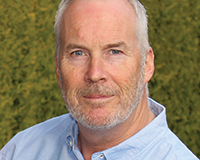Alan Burke is one of the industry’s high flyers, with more than 30 years’ of experience in development, funding, joint ventures and city regeneration. But in 2015, he suffered from a debilitating breakdown. Here, he talks about his experience and how he fought his way back

I love the property industry and have been a part of it for more than 30 years. In many respects, it has made me who I am. It has certainly allowed me to make a good living, meet great people and have a fantastic standard of life. But it also very nearly finished me off.
As a young man, I took everything in my stride – the learning, the travelling, the growing demands on time, the exams, the late hours, work/life balance, the negotiating, the joys of deals done, the woes of the deals that got away. The pain of failing and the excitement of succeeding and making a difference.
But somewhere, around about 10 or so years ago, the highs started to diminish and the lows became deeper.
What was going on and why? I still do not know all the answers to all of the questions, but I do now understand a lot more about myself and a great deal more about the issues I have been facing – or more accurately refusing to face. One thing is very clear to me: I failed to take care of my mental health and consequently I hit the buffers.
Still, in 2017 depression is a word that conjures up a range of responses and images – all of them pretty negative. Someone who suffers from depression “can’t hack it”, is “weak”, is a “risk to the business”. It is the stuff of nonsense.
SEE ALSO: LionHeart crusades for property’s mental health
Dealing with depression
Even a cursory glance at the national and international statistics prove what a widespread and worryingly common affliction depression is. I say affliction because although I suffer from it and am still receiving treatment from psychologists and psychiatrists, I am still not sure whether I am ill, have a disease, a genetic problem, or simply have developed a way of thinking that needs to be corrected and re-balanced.
If only it were simple. I know nothing of science or medicine but I do know that the mind, the brain, our ways of thinking and our ability to develop ingrained habits, particularly bad ones, is a frighteningly complex issue.
What makes a perfectly rational, reasonable, successful, happy and balanced (well almost!) property professional find themselves at times literally unable to function, to drive a car, to make or receive a phone call, to write a coherent paragraph, to lose his ability to problem solve and become an anxiety-wracked shadow of his real self?
For me, these debilitating periods of my life started during my 30s and grew more and more intense and frequent with age. The triggers, which I now understand periodically set me on a path of temporary self-destruction, have been increasingly activated at lower and lower thresholds.
A continuing journey
For me, this culminated in a rather spectacular blow out in 2015. Thankfully, because things became too difficult for me (and my family) to go on, I finally fronted up to my condition – I stepped back from the heat of the workplace and have invested the best part of the last two years understanding, accepting and, most importantly of all, actively tackling my problem.
It hasn’t been easy and still isn’t, but neither, surprisingly, has it been all negative. One of the things that attracted me to property in the first place – the exposure to a wide variety of people and experiences I was sure it would offer me – has proved to be very much part of my ongoing recovery.
I have been both amazed and humbled by the response of my closest friends, colleagues, clients, partners and associates to my plight. Hard-nosed and hard-pressed property businessmen and women who have been so empathetic, supportive, understanding, loyal and caring.
Without doubt, this collective response was the beginning of the end of my darkest years. Bringing my issues into the open and facing up to them with the help and support of those I admire, respect and want to work with has been my salvation.
I am on a journey. If I were a car, I would be firing on three cylinders, but I can feel the full power of the engine beginning to kick back in.
Alan Burke is managing partner of Alan Burke Consulting
LionHeart and the John O’Halloran Initiative
The tragic suicide of John O’Halloran, a Fellow of the RICS and former MD of BAA Lynton, prompted action from the industry last year to improve awareness of mental health issues within the property industry, and help employers provide better support for staff.
O’Halloran’s family and former colleagues, including Howard Morgan of Real Service, hosted their first mental health symposium at CBRE’s London headquarters last year.
Its aim was to encourage a more open culture towards mental health in the industry.
Members of the steering committee, including past president of the BPF Gordon Edington, O’Halloran’s son Rob and former colleagues Morgan and Simon O’Donnell, are now working with LionHeart, the charity that supports
RICS professionals, to take forward a longer-term mental health initiative.
This will include events in Bristol, Manchester and London during this year’s Mental Health Awareness Week (8-14 May).
LionHeart is also offering new mental health/wellbeing workshops as part of the JOH Initiative. Click here for more information.











